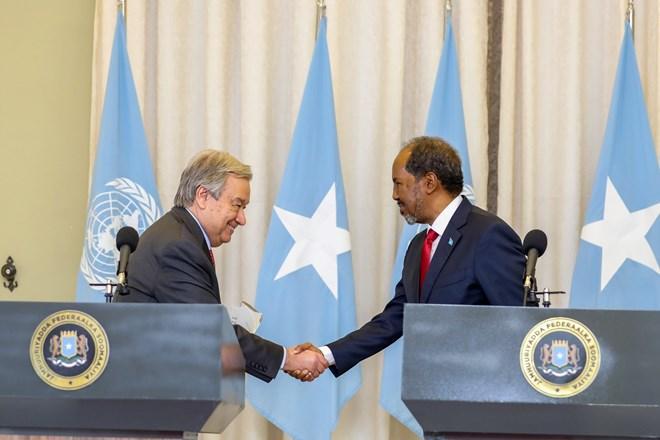The recent interest of various international organizations and powers in Somalia’s developments is evident in several events. Firstly, during his visit on April 11th, the Secretary-General of the United Nations, Antonio Guterres, warned of the worsening situation in Somalia. Secondly, the Somali President Hassan Sheikh Mahmoud participated in a tripartite summit with Ethiopian Prime Minister Abiy Ahmed and Italian Prime Minister Giorgia Meloni during her visit to Ethiopia on the 14th and 15th of the same month. These developments have raised numerous questions regarding the underlying factors and reasons behind the growing international interest in Somalia at this particular stage.
A Striking Transformation
The timing of Guterres’ visit to Somalia holds significant importance due to the country’s ongoing challenges in the humanitarian, security, and food sectors, exacerbated by the current drought crisis. Guterres emphasized the severity of the situation, stating that approximately 8.3 million Somalis, which accounts for nearly half of the population, urgently require humanitarian aid. Additionally, he highlighted that only 15% of the required aid, totaling $2.6 billion for this year, has been provided so far.
During a press conference in Mogadishu, Guterres expressed his disapproval, stating that “It is completely unacceptable for famine to be a looming threat.” He went on to warn the international community that “Somalia is on the brink of the abyss,” and urged for the necessary support to be provided to Somalia to tackle these challenges.
Following his visit with Guterres, Somali President Hassan Sheikh Mahmoud attended a tripartite summit in Ethiopia with Ethiopian Prime Minister Abiy Ahmed and Italian Prime Minister Giorgia Meloni. The Italian Prime Minister had previously met with Sheikh Mahmoud in Rome on February 9th, indicating Italy’s interest in enhancing cooperation with Somalia, particularly in the economic and security sectors. At the summit, President Sheikh Mahmoud presented updates on the situation in Somalia, including the outcomes of the ongoing military campaign to eradicate the terrorist group “Al-Shabaab” and drive them out of Somali cities.
Several Motives
There are several motives that explain the increasing international interest in Somalia at this time, including the following:
- Supporting the fight against terrorism: Numerous international and regional organizations and powers have expressed a particular interest in monitoring the ongoing conflict between the Somali government and the terrorist group “Al-Shabaab”. They believe that the potential outcomes of this conflict will impact their interests and security, given Somalia’s strategic location near major transportation lines in the Bab al-Mandab and the Red Sea. In this context, Milanesi sought to seize the opportunity of the trilateral meeting to gain insight into the developments of the military confrontation. The Somali government forces receive substantial international support, primarily from the United States, which is committed to maintaining US forces in Somalia and conducting targeted military operations against specific terrorist leaders within the country.
During the Addis Ababa summit, President Sheikh Mahmoud asserted that the initial phase of Somalia’s anti-terrorism campaign had been successful. He also mentioned that a joint operation, supported by neighboring countries, was scheduled to take place soon to eradicate terrorist organizations that aim to destabilize security and stability in Somalia and its neighboring nations.
It is worth mentioning that during his “solidarity” visit to Somalia, the United Nations Secretary-General emphasized that the ongoing humanitarian crises in the country create a favorable environment for the continuation of terrorist activities. He highlighted that climate change is a significant factor in Somalia’s terrorism and drought, which exacerbate the crisis and require significant support from the international community.
- Enhancing Italy’s economic diplomacy: The current Italian government, led by Giorgia Meloni, continues to adopt the policy previously pursued by previous governments, which focused on enhancing economic cooperation with countries in the Horn of Africa region, while ensuring a link between Rome’s efforts to achieve stability in the region and the economic diplomacy that accompanies it. Through this policy, Italy aims to expand its available options on the international stage, particularly in light of the new developments that have emerged in this arena, including the outbreak of the Russo-Ukrainian war since February 24, 2022, which is not expected to reach a near end in the medium term at least.
In this context, Milani expressed her interest in encouraging Italian companies to invest in the reconstruction of Somalia. During his visit to Italy on February 9th, President Sheikh Mahmoud called on Italian companies to have an active presence in investment fields in his country. After meeting with the Somali president, Milani said: “I talked to the President of Somalia… If we decide to invest in stability, reconstruction will be an issue tomorrow, and Somalia has a problem with training in the construction sector. As we do here in Ethiopia where work is progressing at a rate of 100%, I think this is the right approach.”
- Combatting illegal migration is a crucial issue for Italy, driven by various security, political, and economic concerns. The government is committed to taking further measures to curb the influx of illegal migrants from southern Mediterranean countries. In line with this objective, the Italian authorities declared a state of emergency for at least six months on April 11th to address the surge in the number of immigrants arriving from the northern coasts of Africa.
However, Rome is not content with these measures and is seeking to broaden its options in dealing with the consequences of this phenomenon. Therefore, it is striving to increase its cooperation with several African countries to confront the repercussions caused by the ongoing waves of migrants arriving in Italy. According to Rome, one of the reasons for the persistence and escalation of this phenomenon is related to the deterioration of internal crises in many of these countries. This is due to the ongoing armed conflicts and civil wars, as well as the failure of efforts to reach political settlements for these crises.
- Responding to development needs: This is one of the objectives of the 2023 Humanitarian Response Plan announced by the United Nations to help millions of Somalis who are facing livelihood crises. The plan aims to raise $2.6 billion to assist those affected by the humanitarian crisis, as it represents one of the main avenues for addressing the challenges facing Somalia.
Renewed Steps
These considerations suggest that international support for Somalia is likely to increase in the near future. The focus will be on preventing further deterioration of living conditions and preventing the escalation of terrorist activity that may arise from the situation. Terrorist organizations such as ISIS may try to exploit the situation to enhance their influence or to counter the pressures and strikes they face from the Somali authorities and international anti-terrorism forces, as seen with the Al-Shabaab movement.


